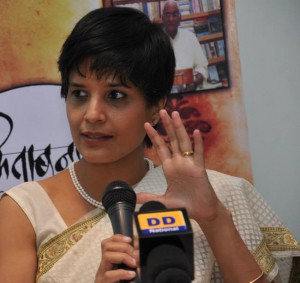“First Person” by Richard Flanagan
My review of award winning Australian writer Richard Flanagan’s latest novel First Person was published in The Hindu on Sunday, 4 February 2018. I am also c&p the text below.
Flanagan examines the art and artifice of autobiography writing
Kif Kehlmann, a writer struggling to write his first book, is approached by his childhood friend Ray to ghost-write a memoir of Ray’s boss. The said boss is Australia’s most notorious conman Siegfried Heidl or Ziggy, who had swindled banks of 700 million dollars. Ziggy is out on bail.
This gives his publisher, Gene Paley of Schlegel Trans-Pacific Publishing, about six weeks to commission a “page-turner” and have it published in time for the trial.
For this Ziggy is to be paid the handsome sum of $250,000 whereas Kif is offered $10,000, with no royalties, to be paid in equal instalments upon submission of the manuscript and the publication of the book. If Kif failed to deliver he would be paid only the termination fee of $500.
Faustian pact
The book is about Kif attempting to get Ziggy to share incidents from his life which he could then convert into a saleable story. This Faustian pact is a soul-sapping task for Kif as Ziggy is evasive or spins incredibly fantastic tales that are impossible to verify.
There are rumours of Ziggy’s links to the CIA in Laos in the early 1970s, of him being hired by NASA to establish a rocket facility in the southern hemisphere, being involved in the deposition of Australian Prime Minister Whitlam and his alleged role in the Allende-Chile affair. Kif’s description of Ziggy is apt: “Even working with him it was hard to see him. I remember he didn’t have much hair and he was of indeterminate age, small, slightly stout, [a] hobgoblin… little sorcerer… From the beginning he was always there and never to be found.”
The novel traces Kif’s growing frustration with his elusive subject. Kif had hoped that the book would be his ticket out of writerly poverty and perhaps fetch him a better publishing contract. While those possibilities seem to recede, his current publisher becomes more and more difficult.
Paley dispels any notion Kif may have had about artistic freedom by mentioning that in France ghost-writers are called Nègres or slaves.
With such limiting conditions, Kif sets to work, inventing where he cannot find facts. He delivers the page-turner within the stipulated time by “learning to distract from the truth by amusing the reader; to flatter the reader by playing on what they believed to be their virtues — their idea of goodness and decency — whilst leading them even further into an alien darkness that was the real world and, perhaps, the real them; and, on occasion, I feared, the real me.”
In the early 1990s, Richard Flanagan had been hired by the fraudster John Friedrich to ghost-write his autobiography in six weeks as he awaited trial for a 300 million dollar fraud. Friedrich died during those six weeks, as does Siegfried in the story.
Writing the self
Although First Person is promoted as a novel, it closely follows Flanagan’s experience of ghost-writing a novel for a criminal. It brings into focus much-debated issues of craftsmanship, of remaining true to one’s art or capitulating to market forces.
Flanagan also questions the premise of autobiography as an art form. Autobiographies are trending now as they go well with the general preference for reality shows and intimate confessions made in the first person.
For Flanagan, an autobiography is a literary selfie.
When Kif dwells on the fine balance between truth and storytelling in an autobiography, he too concludes that “a memoir was a series of selected lies”. Kif is a nom de plume, a short for “keefer” — a substance, especially cannabis, smoked to produce a drowsy state.
Isn’t the reader expected to suspend her disbelief while reading the novel?
First Person; Richard Flanagan, Chatto & Windus, ₹599

